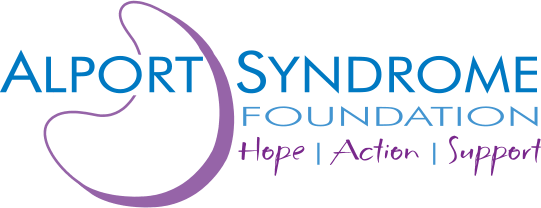Converse with Your Physician Like a Pro
Facing Alport syndrome means you’re welcomed into a world of Kidney and Alport vocabulary and regular visits with a nephrologist. Your primary care medical professional and all others on your care team should also be made aware of your diagnosis.
See below for the Top 5 terms patients and families should know. Scroll further down the page for a longer listing of Alport syndrome and kidney disease-related vocabulary.
TOP 5
ALPORT
TERMS
To help facilitate more informed conversations with your doctors and better understanding of your lab results from blood and urine tests.
1
GFR (Glomerular Filtration Rate)
GFR is an index of overall kidney function that is calculated using your creatinine level, age, gender, and other factors. GFR is presented as a percentage from 0-120, with 90+ representing normal renal function. A GFR of 15 and under represents stage 5, the final stage of kidney failure when dialysis or transplantation are needed to support your kidney function.
2
Creatinine
Chemical waste product from the metabolism of creatinine. A Creatinine blood test is used to indicate renal function, often expressed to a patient as a GFR percentage. An average creatine level for males with normal renal function is 0.6 to 1.2 mg/dL. Females with normal average function range from 0.5 to 1.1 mg/dL. Creatine levels can fluctuate due to medications, hydration, high blood pressure, and other factors.
3
Albuminuria
An abnormal excretion rate of albumin (a type of protein) in the urine. Albumin leakage from the kidneys must be monitored closely by your physician. Microalbuminuria refers to the excretion of 30-299 mg of albumin every 24 hours. As the amount of albumin in your urine increases, the term albuminuria or proteinuria is used to describe the condition.
4
Hematuria
The presence of blood in the urine. Microhematuria refers to blood in the urine that is only visible under a microscope. For many patients, microhematuria is the first physical symptom of Alport syndrome. Microhematuria can be detected via a simple urinalysis.
5
ACE Inhibitors + ARBs
At this time, there is no FDA approved treatment for Alport syndrome and gene therapy and/or gene editing is not available. The current standard of care is angiotensin-converting enzyme (ACE) inhibitors and angiotensin receptor blockers (ARBs). ACE and ARB medications are proven to slow the spill of protein into the urine, slowing the scarring of the kidneys.
Angiotensin converting enzyme inhibitors: Commonly referred to as ACE inhibitors, these medications block the production of angiotensin II, the active form of angiotensin. ACE inhibitors, which help moderate the body’s fluid balance and blood pressure, are part of the current, standard treatment of those affected by Alport syndrome. ACE inhibitors are often used in conjunction with ARBs (angiotensin receptor blockers).
Angiotensin receptor blockers: Commonly referred to as ARBs, these medications block the action of angiotensin II. ARBs help moderate the body’s fluid balance and blood pressure and are part of the current, standard treatment of those affected by Alport syndrome. Often used in conjunction with ACE (angiotensin converting enzyme) inhibitors.

Additional Vocabulary
Aldosterone inhibitors: These medications block the action of aldosterone. Often prescribed to those affected by Alport syndrome as a means of controlling blood pressure.
Anemia: Condition in which the body lacks an adequate amount of healthy red blood cells. Decline in renal function of Alport patients can result in this condition.
Bilateral sensorineural hearing loss: This type of hearing loss involves hearing impairment in both ears. This is often one of the first symptoms of Alport syndrome, aside from abnormal kidney lab results.
Binders: Also called phosphate binders, these pills are taken with meals and snacks to prevent the body from absorbing phosphorous from the foods eaten. Binders are important for patients on dialysis and awaiting transplantation.
Biopsy: Medical procedure in which a needle is inserted through the skin to retrieve a tissue sample. Alport patients may undergo a biopsy for initial diagnosis or for check-up post-transplantation.
Creatinine: Chemical waste product from the metabolism of creatine. A Creatinine blood test is used to indicate renal function. This will be the most commonly referred to piece of information on your lab results as an Alport syndrome patient.
Hemodialysis (HD): A form of dialysis in which the blood is cleaned with the assistance of a dialyzer machine. Blood exits the body into the machine where it is cleaned of waste by a special filter and then returned to the body. This procedure is most often performed at a clinic multiple times a week, but can also be done at home with adequate training and supervision.
Hyperkalemia: Condition in which the body retains potassium in the blood. Hyperkalemia is often a side effect of ACE inhibitor use. As ACE inhibitors are part of the current, standard treatment for Alport syndrome, many patients face this issue and are required to reduce potassium intake in their daily diet and/or take certain medications to help the body excrete excess potassium..
Hypertension: Commonly known as High Blood Pressure, high BP, or simply HBP, this refers to a condition of constantly elevated Blood Pressure. HBP negatively affects the kidneys. HBP is directly correlated to renal function.
Immunosuppressant Drug: These drugs, taken by almost all transplant recipients, suppress the strength of the recipient’s immune system in order to prevent organ rejection. Commonly referred to as “immunos.”
Peritoneal Dialysis (PD): Often abbreviated PD, in this type of dialysis the abdominal cavity is filled with a sterile solution called dialysate which collects waste products and excess body fluid. These are then removed from the body via an abdominal catheter. PD can be performed manually or automatically (with use of an electronic machine called a cycler). PD is generally performed in the home with daily treatment times varying per patient.
Phosphorous: A mineral component of your bones, teeth, and cell membranes. It is required in your body for making proteins, and for the growth and repair of cells and tissue. Those with declining kidney function are required to limit their intake of phosphorous, which, if unmoderated, can lead to bone and cardiac issues and an increased risk of death. Phosphate binders are prescribed to help reduce the body’s absorption of phosphorous.
Potassium: A major intracellular electrolyte in the body that controls the electrical conductivity of the heart, acid-base balance, and helps regulate blood pressure. Potassium is limited in the renal diet to prevent heart abnormalities, as kidneys with declining function cannot properly regulate potassium levels in the body.
Preeclampsia: Disorder of pregnancy affecting a portion of females with Alport syndrome that occurs after 20 weeks gestation consisting of new onset high blood pressure (BP > 140/90) and proteinuria (protein in the urine). Preeclampsia complicates roughly 3-5% of all pregnancies (Alport and non-Alport) and is more common in first pregnancies.
Proteinuria: Protein in the urine. Proteinuria is an early indicator for diagnosis of Alport syndrome.
RBC: Acronym for Red Blood Cell. Found on routine lab work, an RBC count refers to the number of red blood cells in your body. Kidney disease results in decreased RBC count. RBCs serve the body by transporting Oxygen to blood cells and Carbon Dioxide to the lungs.
Rejection: Process in which the body’s immune system attacks and destroys a graft (transplanted organ). Immunosuppressant medication is taken to prevent the likelihood of rejection.
Registry: A list of patients and their basic health information which can help advance disease research. All U.S. patients are strongly encouraged to join the ASF Alport Patient Registry.
Tinnitus: Formal term for a distinct ringing in the ears. Subjective tinnitus means it is only internally heard by the affected individual. The ringing can be temporary or permanent and can range in intensity of volume on an individual basis. While there is no cure for tinnitus, coping mechanisms, including hearing aids, help mask the unwanted noise. Tinnitus is a challenge faced by many within the Alport syndrome community.
Urine Protein Creatinine Ratio (UPCR): This test helps assess kidney function by measuring the amount of protein and creatinine in the urine.
WBC: Acronym for White Blood Cell. A WBC count refers to the number of White Blood Cells in the body. An abnormally high or low count is indicative of a blood disorder or other medical condition. WBCs serve the body by fighting off infection and foreign invaders.
Additional Terminology Resources
Dr. Anjay Rastogi, M.D., Ph.D., provides an overview of what our kidneys do and how to interpret kidney lab results in this informative Webinar.
For additional information on common renal terms, particularly those found in your lab reports, please refer to National Kidney Foundation’s comprehensive “Understand Your Lab Values” document.
For terminology specifically related to the kidney diet, please view our Renal Diet Guide. Our guide includes food alternatives and steps you can take to ensure a healthy, kidney-healthy diet.
Get connected to the Alport Community
Join the Alport Community of patients and caregivers on Facebook.
